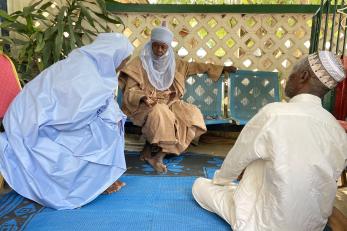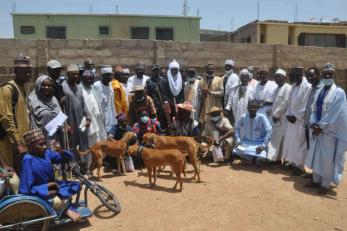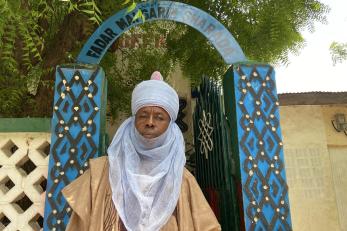Dialogue proves effective for conflict mitigation in Kano state

In Sharada community, Kano Municipal, Kano state, hunting is a way of life and source of income for many residents. Some hunters use trained dogs to hunt animals in the wild. Unfortunately, this has posed a problem for other residents whose domestic animals become prey to the hunting dogs at night. Community members increasingly complained of vandalism and shop burglary, supposedly committed by those who hunt at night. In the past, community members would report incidents to the police but proved ineffective as the attacks and burglaries continued.
Alhaji Ilyasu Muaza Sharada is the village head of Sharada community, a trained mediator and chairman of the Community Peace Observers (CPOs) of the Community Initiatives to Promote Peace Program (CIPP), who decided on an alternative approach to address the problem. On the 28th of May 2022, he convened a dialogue with hunters, ward heads, vigilante, CPOs, the chief Imam of the community, representatives of the Christian community, the Divisional Police Officer (DPO), and other stakeholders to find a lasting solution to the problem.

During the dialogue, community members were able to address the issues, identify the root cause, and collectively agree on a way forward jointly and directly. This approach revealed that the young children would take the dogs out at night and their inability to control the dogs led to the attacks on domestic animals and general vandalism experienced.
At the end of the dialogue, all participants agreed that the existing law that prohibits hunting in the night in Sharada should be enforced. Community members also agreed on a reporting chain which begins with reporting offenders to the ward head and escalates to the District Head (Hakimi) should the ward head be unable to resolve the issue. In addition, anyone caught roaming the streets at night will be taken to the police.
According to the village head of Sharada, “it is from our engagements during the CPO meetings and the CIPP training that we realized we could convene a stakeholders’ meeting to address the issue, as the issue had been reported to the police many times in the past without resolution. It enabled us to identify the root cause of the problem and collectively agree on a solution. I am also planning to establish a peace club in the community to discuss issues around tolerance and peaceful coexistence.”

A month after the dialogue, the village head and Divisional Police Officer (DPO) attest that there have been no reported cases
The presence of relevant security stakeholders and conflict actors at the dialogue facilitated collaboration in the identification of conflict prevention and mitigation measures. This linkage across security structures will ensure full dedication and cooperation of relevant parties in the implementation of the agreed resolution.
About the CIPP
Mercy Corps is implementing the Community Initiatives to Promote Peace (CIPP), a five-year peacebuilding program funded by the United States Agency for International Development (USAID).
CIPP’s aim is to prevent violent conflict in the most at-risk communities across Katsina, Kaduna, Plateau, Kogi, Kano and Benue states in Nigeria’s North-West and Middle Belt regions. CIPP works with community leaders, women, government officials and state-level actors to improve their ability to peacefully manage disputes. CIPP also works to strengthen Early Warning and Early Response (EWER) mechanisms for timely response to violent conflict, and facilitate collaboration among communities with government agencies, civil service organizations and local leaders to address root causes of conflict.
CIPP is implemented in partnership with Pastoral Resolve (PARE), Interfaith Mediation Centre (IMC), Savannah Centre for Diplomacy, Democracy and Development (SCDDD), and the African Radio Drama Association (ARDA).